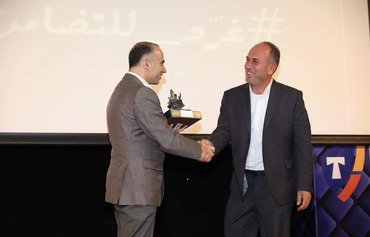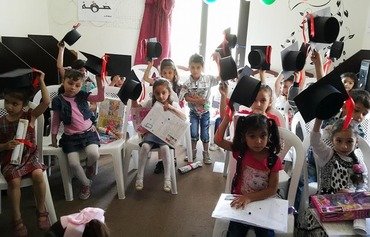More than 1,000 Syrian children in Lebanon and Syria recently completed a pilot programme that sought to inoculate them against the ideology and recruitment efforts of groups such as the "Islamic State of Iraq and the Levant" (ISIL).
The Adyan Foundation, which promotes interfaith studies and spiritual solidarity, rolled out the Education for Peace and Resilience programme in Lebanon during the 2015-2016 school year, in collaboration with local partners.
The programme, which served children in refugee camps between the ages of 6 and 15, offered psycho-social support and peace education as well as reinforcing religious diversity through weekly activities in schools and education centres.
In July, the foundation held a workshop to evaluate the programme with educators in Syria and Lebanon, who concluded that it should continue in view of its success in influencing children’s thinking and behaviour.
Al-Ihsan Academic Centre, based in Akkar in northern Lebanon, serves 260 students between the ages of 4 to 15, under the supervision of Syrian teachers.
"Since we opened the centre three years ago with backing from the Malak Foundation, we have been dealing with many problems among the children, such as violence, prejudice against others, reclusiveness and concern about the influence terrorist organisations may have on their thinking and behaviour," said the centre’s director of education, Abdul Rahim Hassian.
The programme has been helpful in promoting a culture of dialogue and tolerance, he told Al-Mashareq, noting that it has been successful in guiding students towards the rejection of extremism and violence.
The centre had previously observed that many of the students "were ignorant about these matters and have misjudgments about other religions", he said, adding that "we worked hard to teach them cultural and religious diversity and make them aware of the dangers of extremist ideology".
"Our students realised that [suicide] bombers and terrorists are criminals against themselves and religion, and know now how to resist the terrorist groups’ enticements and attempts to recruit and brainwash them," he said.
Comprehensive teacher training
Before taking part in the programme, 47 educators in Lebanon and Syria received training via 24 interactive educational courses, programme director Samah al-Helwani told Al-Mashareq.
"What the teachers and educator activists from various backgrounds learned, they applied during the 2015-2016 school year in schools and educational centres that take in Syrian students," she said.
Each week, the approximately 1,380 students in Lebanon and in Damascus, Aleppo, Homs and Tartus in Syria were offered hour-long classes that addressed safety, violence, dialogue and cultural, religious and social diversity, she said.
"Our programme aims to protect children and make them aware of the dangers that lurk around them, primarily the possibility that they could be influenced by terrorist groups who seek to mislead them," she said.
The July programme evaluation workshop highlighted the vital role education can play in populations affected by conflict, she said, adding that reports submitted by educators show that education is "a real hopeful tool for building peace and a promising future for the younger generations".
Evaluation forms turned in at the end of the school year indicate that more than 60% of children who took part in the training now say they would not join extremist groups, al-Helwani said.
Additionally, children who used to say they wanted to return to Syria to join armed groups now say they want to live in peace and get an education, she added.
Protecting teenagers from brainwashing
Lebanese University professor of social work and development Rania Mansour, who also serves as president of the Modern University for Business and Science department of social work, said she noted remarkable improvement in the behaviour of Syrian children during her monitoring of the programme.
"These children come from a country that shares borders with several other countries, and from communities with different cultures and traditions, and add to this the armed conflicts they experienced and heard about," she said.
While they once displayed a propensity for using violence to resolve disputes, she said -- even with their own parents -- they now make greater use of peaceful solutions and dialogue.
The programme, which sought to help Syrian children preserve their identity while learning to accept others of different cultures and religions, focused primarily on inoculating children against joining terror groups, Mansour said.
It focused on displaced children and refugees in their late teens, she said, as this is the age group most susceptible to being brainwashed by groups like ISIL.
By highlighting citizenship, instilling a sense of belonging and providing psychological support, the programme hopes to immunise displaced Syrian children against falling prey to malign influences, Mansour said.

![Two Syrian boys, wearing shirts that denounce terrorism, take part in the Education for Peace and Resilience programme at al-Ihsan Academic Centre in Lebanon. [Photo courtesy of al-Ihsan Academic Centre]](/cnmi_am/images/2016/08/08/5976-Syrian-children-programme-600_384.jpg)







I want to join and work with you.
Reply1 Comment(s)